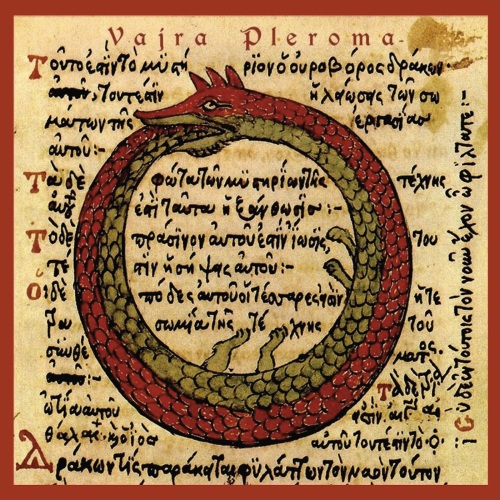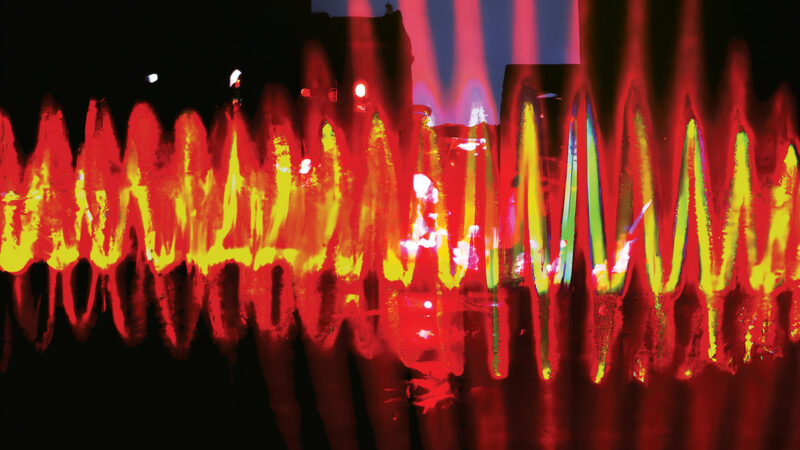By Liz Beliloskaya
The word Pleroma is a Greek word that speaks to the fullness and toatlity of divinity. Pleroma, the album by Vajra is not for everyone. The album features heavily progressive music accompanied by haunting, yet skillful vocals resembling something close to a more nuanced Evanescence. Infused with Eastern influences throughout, the tone of the album is light years away from the mainstream crowd.
It’s immediately clear that there is no easing into the album as “Inside the Flame” begins playing. The seriousness of the music is readily apparent, as the provocative sound of guitars penetrates deep into your psyche; you can feel the suspense building for the impending eruption of musical intensity. The haunting vocals of lead singer, Annamarie, complete the effect.
A softer lead-in on “Almost One” offers up a nice contrast to the last track. It’s not as hefty, but manages to retain enough gravity to be taken seriously. The loose melody remains impactful as the drums deliver heavy percussion consistent throughout the album. I have to give credit to how the song is mixed; it’s well arranged and successfully balanced.
Eastern influences are probably the most evident on “India,” a soft, mysterious and aloof instrumental. It’s both haunting and enticing, but then again, it might be too “world music” for some. Next up is “Blind.” Continuing the India-inspired trajectory of the last song, it offers up a new side to Annamarie’s vocals. When she isn’t singing with her full intensity, she actually manages to sounds a little bit like Madonna, at least the way she did when she though she was Indian. The touches of sitar here and there add a nice component.
“Intuition” provides a much-needed break from the general intensity of the album. It features pleasant guitars and softer vocals as the singer uses her voice in a slightly calmer and feminine, although serious, manner. The organic drums create a suppler vibe and harmonious quality. Of course, it gets darker and picks up intensity as it progresses, but not as much as the previous songs do.
I wish “Erode the Will” was more upbeat and less intense as listening to the long vocals and the aggressive music tends to get a little difficult in consecutive order. While the composition of the track is excellent, the somber mood of it is not. The next track is “3.14.” The mysticism of India and the lead vocalist’s lamenting style seems to portray an ongoing continuum of sadness. The morose and mellowness of her voice is deeper and smoother, but less intense on this track than many others. It’s a little too depressing for my taste. Also, I wonder if it has anything to do with Pi.
The sitar is a great addition on “See Through You,” providing balance to the dark and gloomy track. Next is “Akkord Pleromy”, a dissonant track full of bells, chimes and menacing church-like clanking. There are no vocals on it, thank god, as the intensity is just too overwhelming.
Pleroma closes with its strongest work, “The Apple.” It features the coolest composition, a brighter disposition than the rest of the album, and a good tempo over a pleasant guitar melody. It speeds up towards the end, reintroducing the heavy gloominess of Pleroma.
Overall, the album is definitely an acquired taste, probably just like Annamaria Pinna, lead and mastermind behind the band, intended it. Sure enough, it is singular in its composition, features interesting Eastern influences, and carries a distinct sound, which may be just a little too heavy to be fully enjoyable for the masses, although it will find it’s own loyal audience.


 Out of 5
Out of 5
Follow Us on Twitter @ http://twitter.com/planetill
Become a citizen of Planet Ill. Join our Forums
Join Us on the Planet Ill Facebook Group for more discussion
Follow us on Networked Blogs






